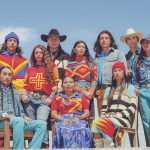
Capital Briefs | Interior to host tribal consultations
WASHINGTON
The Department of the Interior announced Tuesday nation-to-nation consultations with tribes on the Bipartisan Infrastructure Law.
The consultations are Jan. 26 to 28 and are closed to the public. Tribes are also invited to submit written comments to consultation@bia.gov by Feb. 4, 2022.
These sessions will focus on tribal climate resilience, water infrastructure and drought resilience, water rights settlement, wildfire resilience, ecosystem restoration, legacy pollution and U.S. Geological Survey infrastructure.
The law invests more than $13 billion in tribal communities across the country to bolster community resilience, replace aging infrastructure, expand access to clean drinking water and help ensure access to high-speed internet.
Interior Secretary Deb Haaland said, “Tribal leaders know best the needs of their people. It is critical that tribes continue to be at the decision-making table as we implement this historic opportunity.”
The Interior Department received a $466 million investment for the Bureau of Indian Affairs for infrastructure projects and climate resiliency initiatives, as well as an investment of $2.5 billion to help fulfill pre-existing settlements of Indian water rights claims in the Bipartisan Infrastructure Law.
The law also made tribal communities eligible for additional department programs to support building resilience to wildland fire and drought, restoring ecosystems, enabling fish passage and addressing legacy pollution from abandoned mine lands and orphan oil and gas wells.
U.S. Treasury gives tribes more time to spend CARES Act dollars
WASHINGTON – On Dec. 16, the U.S. Treasury issued new guidance that allows federally-recognized tribes an extra nine months to spend Coronavirus Aid, Relief, and Economic Security, or CARES, Act dollars.
This administrative change will give tribes greater flexibility in spending CARES Act funds, requiring them only to obligate their funds by Dec. 31, 2021, and to spend the funds by Sept. 30, 2022.
On Dec. 8, the House of Representatives passed a bipartisan bill that would extend the deadline by one year, from Dec. 30 of this year to Dec. 30, 2022.
The CARES Act was signed into law on March 27, 2020, and allocated $8 billion to tribes under the Coronavirus Relief Fund.
The Navajo Nation received $714 million.
However, tribes did not receive any funds until May 5, 2020, well after the bill’s statutory deadline. During this time, the Navajo Nation became the most concentrated COVID-19 hotspot in the nation.
The bill was introduced by Rep. Tom O’Halleran, D-Ariz., and Rep. Don Young, R-Alaska.
Agreements finalized for NM chapter projects
WINDOW ROCK – Agreements were finalized for several capital outlay projects in New Mexico chapters.
The projects included water and wastewater infrastructure development, chapter house facilities, and solar lighting.
Earlier this year, Navajo Nation leaders worked with New Mexico Gov. Michelle Lujan Grisham and the state Legislature to secure $14.9 million in capital outlay funds for New Mexico chapters.
President Jonathan Nez said, “With the signing of the inter-governmental agreements, these critical projects move a step further toward completion to benefit our Navajo people and communities.”
The projects include:
- $125,000 to renovate, furnish, and equip the Ojo Encino Chapter House.
- $100,000 to plan, design, construct, and purchase solar streetlights at the Shiprock Industrial Park.
- $75,000 to plan, design, construct, purchase and equip a multi-purpose facility in Whitecone.
- $200,000 to make site improvements and to plan, design, and construct, purchase and equip perimeter fencing for the Iyanbito Chapter.
- $100,000 to acquire rights of way to plan, design and construct a sewer lagoon in the Pueblo Pintado Chapter.
- $500,000 to acquire easements and rights of way to plan, design and construct, including surveying and archeological and environmental studies, water system improvements for the regional San Juan Lateral water project in the Tsé ‘A?náozt’i’í Chapter.
- $779,000 to acquire easements and rights of way to plan, design and construct, including surveying and archeological and environmental studies, water system improvements for the regional San Juan Lateral water project in the Mexican Springs Chapter.
- $599,000 to acquire easements and rights of way to plan, design and construct, including surveying and archeological and environmental studies, water system improvements for the regional San Juan Lateral water project in the Nahashch’idí Chapter.
- $100,000 to acquire easements and rights of way to plan, design and construct, including surveying and archeological and environmental studies, water system improvements for the regional San Juan Lateral water project in the Two Grey Hills Chapter.
- $50,000 to acquire land, easements and rights of way for and to design and construct waterline extensions, including archeological and environmental studies and clearances in the Tsé’íí’áhí Chapter.
- $660,000 to acquire easements and rights of way to design and construct a water system to serve the Vanderwagen community of the Chéch’iltah Chapter.
LA crews work with NTUA to connect homes
WINDOW ROCK – Work crews from the Los Angeles’ Department of Water and Power, working with Navajo Tribal Utility Authority, are extending powerlines to homes in Chilchinbeto, Kayenta, Chinle, Kaibeto and Coppermine.
As of Dec. 9, the president’s office reports, the partnership connected 29 homes since crews arrived from Los Angeles in late November. The goal is to connect as many homes as possible within six weeks.
The LA department is field training work crews to build powerlines in remote communities in bad weather and with rugged terrain.
LA is paying for the costs of labor, equipment and travel. NTUA is providing materials, labor and meals.
Chilchinbeto resident Wilson Big said he is excited to finally store food in his refrigerator, host family and friends, and watch television.
Another nearby resident said that his wife, who is diabetic, can now store medication in their refrigerator and not have to rely on a generator.
President Jonathan Nez said the LA partnership builds upon the CARES Act, which allowed more than 700 Navajo families to receive electricity, among many other projects.
Delegate, aging staff deliver food to elders
WINDOW ROCK – On Dec. 13, Delegate Mark Freeland, chapter officials and Division of Aging and Long-Term Care Support staff delivered food to 15 elders and their families in the Nahodishgish and Standing Rock chapters.
Crews delivered the packages in the Christmas spirit and as the Navajo Nation prepares for a cold winter.
The food was donated by the Rotary Clubs of Del Norte and Del Sol of Albuquerque.
Freeland said, “My chapters send their appreciation to the Rotary Club members for being great partners as we deliver food and essential items to our most vulnerable families on the Navajo Nation.
“We thank Mr. Emerson Tully and our (Division of Aging) staff for being on the frontlines to assist our grandmas and grandpas,” he said. “Working hand in hand, we will overcome this pandemic.”
The speaker’s office reports that over the last two years, delegates of the Navajo Nation Council have worked with their chapters to deliver personal protective equipment, hand sanitizer, cleaning supplies, and food packages to the people.
Speaker Seth Damon said since July Freeland has worked with chapter officials and community programs to haul more than 50 truckloads of firewood for elders.
NFR recognizes Navajo Code Talkers
WINDOW ROCK – On Dec. 11 during the final go-round of the Wrangler National Finals Rodeo in Las Vegas, the Navajo Code Talkers were honored by the Wrangler National Patriot Program in front of over 170,000 fans and 8 million viewers on live television.
The speaker’s office said it worked with Wrangler and the Professional Rodeo Cowboys Association to coordinate the NFR recognition.
Former Navajo Nation Chairman Peter MacDonald, the Navajo Code Talker Association’s president, joined nine-time National Finals Rodeo qualifier Derrick Begay and Army Sgt. First Class Christopher Bullis in the honoring ceremony on Saturday night at the Thomas and Mack Center.
Fort Defiance Delegate Wilson Stewart said, “My community was honored Saturday night because we have two grandfathers who served as Navajo Code Talkers – Mr. Jimmy C. Begay and Mr. James C. Begay – from Fort Defiance, Arizona.”
Delegate Jamie Henio said, “Rodeo is a way of life for many of our Navajo families who ranch and raise livestock. The Navajo Nation applauds our own NFR athletes – Derrick Begay, Erich Rogers, and Danielle Lowman – who are amazing role models for our young people.”
The Navajo Nation Council, he said, appreciates the National Finals Rodeo for recognizing the proud history of the Navajo Code Talkers and the sacred Navajo language.

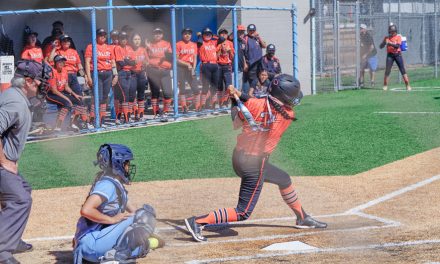
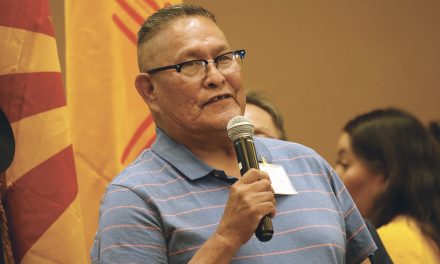

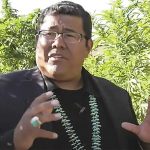
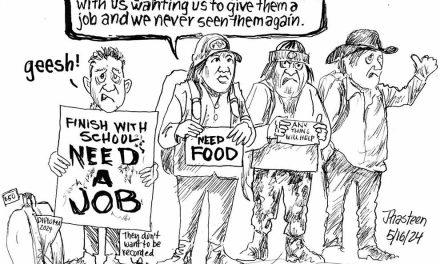


 Highway 264,
Highway 264, I-40, WB @ Winslow
I-40, WB @ Winslow